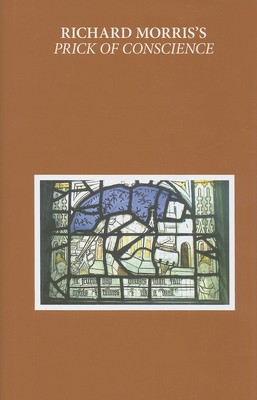
- We will send in 10–14 business days.
- Author: Ralph Hanna
- Publisher: Early English Text Society
- ISBN-10: 019968099X
- ISBN-13: 9780199680993
- Format: 14.5 x 21.8 x 4.6 cm, hardcover
- Language: English, Anglų (1100-1500), Lotynų
- SAVE -10% with code: EXTRA
Reviews
Description
This mid fourteenth-century poem, a discussion of the 'contempt of the world' and the 'Four Last Things', was one of the most popular Middle English texts in its time, as indicated by the large number of extant copies, and illustrations of it in the windows of All Saints, North Street, in York. It was a widely influential compendium of religious instruction, originating in Yorkshire, but more widely disseminated, and thus representing this important regional culture, as well as its absorption into a nationwide religious culture. The only edition, by Richard Morris (1863), is now generally unavailable outside research libraries. The present edition revises Morris's text extensively and offers full modern annotation, including extensive discussion of the poem's sources. Morris's text, although based on an exceptionally good manuscript copy, has been fully collated with the principal early manuscripts; this information is presented in a separate textual commentary. There is an
introduction presenting the poem in its context and a Glossary.
EXTRA 10 % discount with code: EXTRA
The promotion ends in 19d.21:07:11
The discount code is valid when purchasing from 10 €. Discounts do not stack.
- Author: Ralph Hanna
- Publisher: Early English Text Society
- ISBN-10: 019968099X
- ISBN-13: 9780199680993
- Format: 14.5 x 21.8 x 4.6 cm, hardcover
- Language: English, Anglų (1100-1500), Lotynų English, Anglų (1100-1500), Lotynų
This mid fourteenth-century poem, a discussion of the 'contempt of the world' and the 'Four Last Things', was one of the most popular Middle English texts in its time, as indicated by the large number of extant copies, and illustrations of it in the windows of All Saints, North Street, in York. It was a widely influential compendium of religious instruction, originating in Yorkshire, but more widely disseminated, and thus representing this important regional culture, as well as its absorption into a nationwide religious culture. The only edition, by Richard Morris (1863), is now generally unavailable outside research libraries. The present edition revises Morris's text extensively and offers full modern annotation, including extensive discussion of the poem's sources. Morris's text, although based on an exceptionally good manuscript copy, has been fully collated with the principal early manuscripts; this information is presented in a separate textual commentary. There is an
introduction presenting the poem in its context and a Glossary.


Reviews